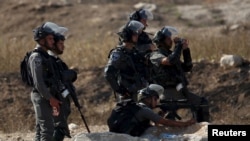In a recent episode of the popular Israeli parody show Eretz Nehederet, “Wonderful Land,” an actor posing as a hardware shop owner laments the current shortage of pepper spray on store shelves and offers alternatives to defending against knife attacks: Nunchucks fashioned from candlesticks and body armor, made out of wooden cutting boards “for full stabbing protection.”
The skit makes light of growing fears among Israelis after a series of attacks by Palestinians in what is being billed by some as a “third intifada.”
The Israeli government has responded, in part, by broadening rules on the use of live fire by security forces and by relaxing the state’s strict gun laws.
“In light of the security situation, I have decided to ease conditions on obtaining firearm licenses,” public security minister Gilad Erdan recently announced, and he lauded citizens trained to shoot firearms as a “multiplying force” in the battle against terror.
Earlier this month, Jerusalem Mayor Nir Barkat called on licensed Israeli gun owners to carry their weapons at all times. “In a way, it’s like military reserve duty,” he told Army Radio.
Israelis are said to have heeded that call. Requests for gun permits have skyrocketed by 5,000 percent, the Blaze reports, citing Israel’s financial ezine, TheMarker.
Israeli law allows only police officers, soldiers and private security guards to carry guns. In addition, citizens living or working in areas considered perilous, i.e., West Bank settlements, are eligible for gun licenses.
Fewer than one in 10 Israelis own a handgun, compared to nearly nine out of every 10 Americans, according to Israel’s Haaretz newspaper.
Because military service is mandatory in Israel, most youths 18 or older have received some weapons training, but if they want to carry a gun after they are discharged, they must meet the same criteria as any other civilian looking to arm himself.
Would-be gun owners must be citizens or a permanent resident of Israel of legal age, pass a background check and weapons training, and prove just cause for carrying a gun. A doctor must certify that the applicant doesn’t suffer from mental illness, epilepsy or even heart disease.
Revised guidelines will allow higher ranking military officers and airport security guards to carry guns when off duty.
But the relaxing of the rules is worrisome to Israel’s sole gun control advocacy group, Gun Free Kitchen Tables (GFKT), a project of the Isha L’Isha Feminist Center.
“Our first concern is that if an armed citizen wants to stop an attacker with a knife, he basically does so by killing him,” said GFKT attorney and spokesperson Galit Lubetzky. “If someone is a danger, there needs to be due process. The police need to stop the attacker, not civilians. He needs to be arrested and tried in court. And if he is found guilty, then he must be punished according to the law, which does not necessarily call for the death sentence.”
Lubetzky cited the danger of shooting a gun in a crowded street, where innocent bystanders could be at risk: “In the heat of the moment, not everybody is a Hollywood action hero.”
She pointed to the recent lynching of an Eritrean man, mistaken for an attacker at a Beersheba bus terminal.
“In a situation of great stress, you don’t always know who’s the attacker, who’s the innocent passerby and who just looks suspicious,” Lubetzky said. “Looking suspicious is always about privileged versus underprivileged - and one’s own bias.”
However, Israeli journalist, broadcaster and activist Yishai Fleisher suggested those risks are exaggerated, pointing out that because of the mandatory draft, Israeli citizens have a “good instinct” for defense and combat.
“In America, when you talk about gun rights, people have guns, but the danger is ephemeral,” Fleisher said. “It’s important to understand that shopping in a Middle East market is not the same as shopping in a Walmart. There are different rules of engagement in everything, and we are not going to allow Western liberal values, which are wonderful, but at times subject us to treating terrorists with kid gloves.”
By taking their guns to the streets, Fleisher continued, Israeli citizens are sending a message to would-be attackers: “We will not be cowed. We will not be broken. We will arm and train our citizenry and we will fight to survive.”




